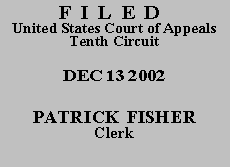

| MARVIN F. JONES,
Plaintiff-Appellant, v. JO ANNE B. BARNHART, Commissioner of Social Security Administration, Defendant-Appellee. |
|
Claimant Marvin Jones appeals from an order of the district court affirming the Commissioner of the Social Security Administration denying disability benefits. Because we conclude that substantial evidence supports the Commissioner's decision, and because that decision was reached in accord with relevant legal standards, we affirm.
Mr. Jones filed his application for disability insurance benefits in 1993, alleging inability to work due to pain in his back, legs and right shoulder, carpal tunnel syndrome in both hands, and vision and mental problems. That application was denied initially and on reconsideration. After a hearing in 1994, an administrative law judge (ALJ) found Mr. Jones was not entitled to benefits. In 1995, the Appeals Council granted a remand based on Mr. Jones's submission of new evidence of his disability.
Following a second administrative hearing in 1996, a new ALJ issued her decision denying disability benefits to Mr. Jones. In that decision, the ALJ found that Mr. Jones suffered from diabetes mellitus, degenerative disc disease, and dysthymia and anxiety, secondary to a substance abuse disorder. The ALJ found that Mr. Jones's capacity to work was limited to light and medium jobs that require only limited use of judgment, occasional and superficial contact with others, and occasional stooping and crouching. The ALJ concluded that despite these limitations, Mr. Jones was capable of performing his past relevant work as an automobile assembly worker and as a cleaner. Thus, the ALJ found that Mr. Jones was not disabled at step four of the Commissioner's five-step process for determining disability. See 20 C.F.R. § 404.1520(e). The burden of proving a prima facie case of disability at steps one through four is borne by the claimant. See Williams v. Bowen, 844 F.2d 748, 751 (10th Cir. 1988). The district court affirmed the denial of benefits, and this appeal followed.
We review the Commissioner's decision to determine whether the relevant findings are supported by substantial evidence in light of the entire record, and to determine whether the Commissioner applied the correct legal standards. Hargis v. Sullivan, 945 F.2d 1482, 1486 (10th Cir. 1991). "Substantial evidence is such relevant evidence as a reasonable mind might accept as adequate to support a conclusion." Id. "Evidence is insubstantial if it is overwhelmingly contradicted by other evidence." O'Dell v. Shalala, 44 F.3d 855, 858 (10th Cir. 1994). In the course of this review, we may "neither reweigh the evidence nor substitute our judgment for that of the [Commissioner]." Casias v. Sec'y of Health & Human Servs., 933 F.2d 799, 800 (10th Cir. 1991).
Although he has been represented by counsel at various times throughout this proceeding, Mr. Jones is appealing this matter pro se. Due to his pro se status, we have read Mr. Jones's brief on appeal with tolerance, affording Mr. Jones a great deal of leniency in articulating his arguments of error. Nevertheless, Mr. Jones's obvious dissatisfaction with the outcome of his administrative proceeding does not persuade us that the Commissioner erred in making her determination. With the benefit of counsel, Mr. Jones raised a number of claims before the district court, which were thoroughly reviewed and found meritless. Our repetition of the legal and factual analysis of that court at this time would be unproductive and superfluous.
We note only that Mr. Jones's reliance on separate disability determinations by the Oklahoma Workers' Compensation Court and the Veteran's Administration as a basis for his social security claim is unhelpful to his appeal. Just as the former determinations did not preclude Mr. Jones from attempting to obtain disability benefits from the Commissioner, neither did they compel the Commissioner to automatically grant those benefits. Simply put, the workers' compensation and veterans administration proceedings are entirely different and separate from a claim under the Social Security Act, with different parties, different evidentiary standards, and different bodies of law governing their outcomes. Compare Okla. Stat. tit. 85, § 22 (schedule of disability compensation under Oklahoma Workers' Compensation Act), and 38 C.F.R. § 4 (Department of Veterans Affairs schedule for rating disabilities), with 20 C.F.R. § 404, subpt. P (social security regulations for determining disability and blindness). While disability determinations by other agencies should be considered, see Baca v. Dep't of Health & Human Services, 5 F.3d 476, 480 (10th Cir. 1993), they are not binding on the Commissioner, see 20 C.F.R. § 404.1504.
We have carefully reviewed the appellate record and we agree with the district court that substantial evidence supports the ALJ's conclusion that although limited, Mr. Jones is not disabled within the meaning of the Social Security Act.(1) Thus, for substantially the same reasons set forth in the magistrate judge's report and recommendation dated September 28, 2001, and the district court's order dated February 1, 2002, the judgment of that court is AFFIRMED.
Senior Circuit Judge
*. This order and judgment is not binding precedent, except under the doctrines of law of the case, res judicata, and collateral estoppel. The court generally disfavors the citation of orders and judgments; nevertheless, an order and judgment may be cited under the terms and conditions of 10th Cir. R. 36.3.
1. This court received the administrative record on appeal on May 31, 2002. We have reviewed appellee's supplemental appendix and note that it is a duplication of the record already on file. Therefore, appellee's motion for leave to file a supplemental appendix is denied.